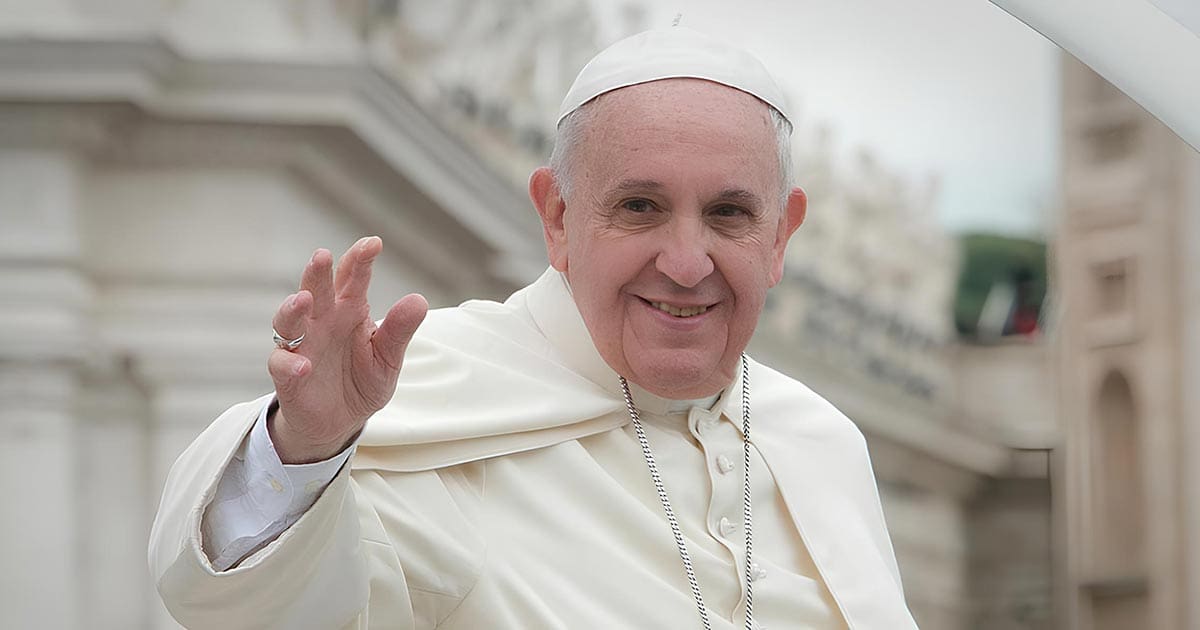“Who Am I to Judge?”: The Pope Who Opened the Door to LGBTQ+ Dialogue

Pope Francis leaves behind a complicated but compassionate legacy for LGBTQ+ people (Pic: Jeffrey Bruno)
As the Catholic world mourns the passing of Pope Francis at the age of 88 on Monday, many LGBTQ+ people will remember him for his determined—if sometimes flawed—efforts to create a more inclusive and welcoming Church.
In 2013, Cardinal Jorge Mario Bergoglio from Argentina was elected as the first Pope from the Americas, taking the name Pope Francis I.
Initially little known to the wider world, he soon made history by significantly softening the Catholic Church’s traditionally conservative stance on homosexuality.
A More Compassionate Tone Towards LGBTQ+ People
While the Catholic Church still holds that homosexual acts are “acts of grave depravity”, describing them as “intrinsically disordered” and “contrary to natural law”, Pope Francis sought to promote a more compassionate and less judgemental approach to LGBTQ+ people.
In a landmark moment in 2013, he stated that although homosexual acts may be considered sinful by the Church, gays and lesbians should not be discriminated against or marginalised for who they are.
On a flight returning from Brazil, Francis told journalists: “If a person is gay and seeks God and has good will, who am I to judge him?”
He added: “The Catechism of the Catholic Church explains this very well. It says they should not be marginalised because of this [orientation], but that they must be integrated into society.”
In a 2016 document titled On Love in the Family, he called for an end to anti-LGBTQ+ violence and discrimination, writing: “Every person, regardless of sexual orientation, ought to be respected in his or her dignity and treated with consideration.”
He went on to state: “Every sign of unjust discrimination [against gays and lesbians] is to be carefully avoided, particularly any form of aggression and violence…”
Apologies and Condemnation of Criminalisation
In response to the Orlando massacre in 2016, Pope Francis said the Church “should apologise to the person who is gay whom it has offended”, adding: “When I say the ‘Church’, I mean we Christians, because the Church is holy; we are the sinners. We Christians must say we are sorry.”
In a 2023 interview, he called for the Catholic Church to actively oppose legislation that criminalises same-sex relationships and identities.
Francis stated that while some may argue that homosexuality is a sin, “it is not a crime”, describing laws that criminalise homosexuality as “unjust” and asserting: “The Church must campaign to end them. It must do this. It must do this.”
Ongoing Opposition to Marriage Equality and Gender Identity
Despite his progressive tone in many areas, Pope Francis remained opposed to same-sex marriage. Speaking in the Philippines in 2015, he said: “The family is also threatened by growing efforts on the part of some to redefine the very institution of marriage… It’s not born of the dream that we have from God and prayer…”
He also publicly supported campaigns against marriage equality in countries such as Slovenia and Mexico, asserting that it was necessary “to preserve the family as the basic unit of society.”
In 2016, he and Patriarch Kirill, head of the Russian Orthodox Church, jointly declared: “The family is based on marriage, an act of freely given and faithful love between a man and a woman.”
Francis also expressed concern over the increasing recognition of gender diversity, warning against what he called “gender theory… that does not recognise the order of creation.” He criticised educational materials that he claimed taught children they could choose their own gender, referring to this as “ideological colonisation.”
Support for Civil Unions and Trans Inclusion
Nevertheless, Francis did continue to show some progression in his views on same-sex relationships and trans inclusion. In a 2020 documentary, he expressed support for civil unions, stating:
“Homosexual people have the right to be in a family. They are children of God.” He added: “You can’t kick someone out of a family, nor make their life miserable for this. What we have to have is a civil union law; that way they are legally covered.”
In 2023, he suggested that priests could offer blessings to members of same-sex couples, encouraging the use of “pastoral prudence” and “pastoral charity” when responding to such requests.
That same year, the Vatican confirmed that transgender individuals—including those who have undergone medical transition—could be baptised as Catholics and could serve as godparents, marking a significant shift from its earlier position.
In 2024, Pope Francis met with LGBTQ+ activists from Uganda and reportedly told them: “Discrimination is a sin and violence against LGBTI people is unacceptable.”
In early 2025, the Vatican also indicated a greater openness to admitting gay men into the priesthood, provided they remained celibate, as is also required of heterosexual priests.
A Mixed but Meaningful Legacy
Francis DeBernardo, Executive Director of the American LGBTQ+ Catholic group New Ways Ministry, mourned the Pope’s passing, calling him “a gift to the Church and to the LGBTQ+ community.”
While acknowledging areas in which the Pontiff fell short, DeBernardo said: “His misunderstanding and mischaracterisation of gender identity did not, however, prevent Pope Francis from reaching out with compassion to transgender people, continually calling for people to respect the inherent human dignity of these minorities.”
He added: “With simple words and gentle gestures, Pope Francis powerfully moved the Catholic Church to become a more welcoming home for LGBTQ+ people.”
DeBernardo expressed hope that “our loving God, who is a God of justice and equality, will continue to bless us by extending Francis’ welcoming and inclusive message in the next papacy.”
Leave a Reply